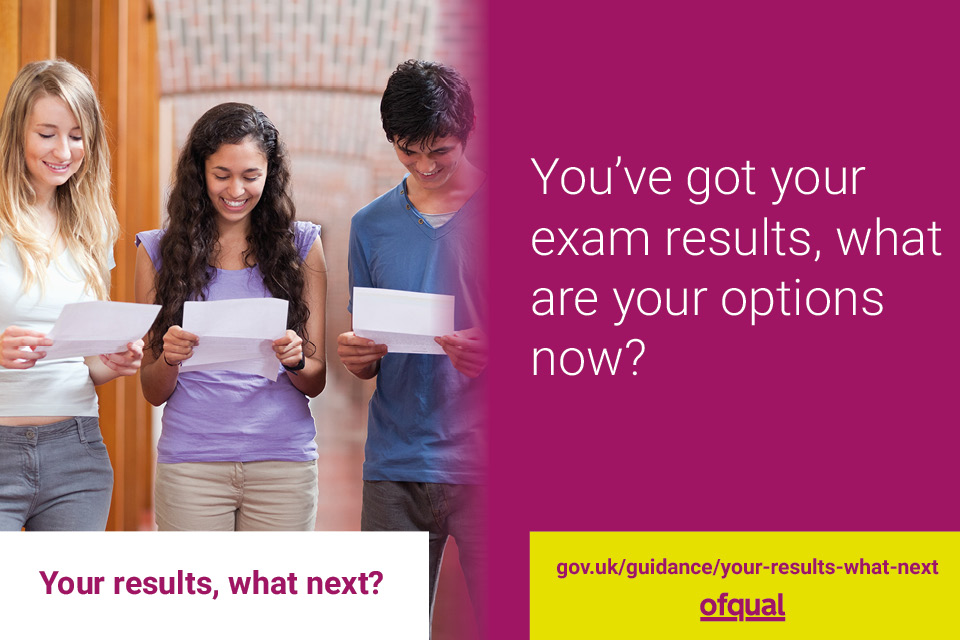Understanding why you might feel worried
There are many reasons why you might feel worried before results day:
Lack of control
Feeling that things are out of your control can be unpleasant. You have often been told that your exams are important. Teachers and parents encourage you to ‘take control’ of your results by working hard and revising. Since schools were closed and exams cancelled, you may feel like this control has been taken out of your hands.
Uncertainty around the future
Having a clear idea of what the future will look like can have a positive impact on your well-being. When schools were closed, it wasn’t immediately clear what would happen with exams or grades this year. Things are clearer now, but you may still have questions: what will the grades be like for students at my school or college? What will schools, colleges and universities look like when the term starts in September? And of course, you might be facing other uncertainties too.
Putting things into perspective
If you are feeling worried about your results, try to put things into perspective:
You still have control
It’s important to remember that your grades are based on a broad range of evidence, taking into account your previous work across the 2 years of your course. Your teachers know you well and their judgements will reflect your work and achievements at school. Remember too, that if you don’t get the grade you wanted, you can take an exam in the autumn.
Things have always been uncertain
Things have been particularly uncertain recently but it’s important to remember that there is uncertainty in every part of life - especially when it comes to exams. You never know exactly what the grade boundaries will be, or what questions will come up, or how you will be feeling and do on the day. It might be helpful to recognise that uncertainty has always been there; this year, it’s just slightly different.
People understand
This year has put everybody in a unique situation, which no one had planned for or experienced before. While this has been difficult, it’s important to remember that wherever you are hoping your grades will take you (to college, university, or employment), people understand the current situation – and are doing their best to ensure that you are not disadvantaged by it.
Coping with feeling worried
Most people have to cope with worries at one time or another and it can be helpful to have strategies to try out when things seem difficult.
Try to stay ‘in the moment’
You have probably heard of ‘mindfulness’, which some people practise as a way to reduce worries and improve their well-being. This is about trying to spend more time thinking about and noticing where you are right now, rather than thinking too much about the future and its uncertainties.
This helps you focus on things that you can see, feel and hear that you enjoy. It might be something as simple as listening to your favourite music, playing a video game or taking a walk. Make a list of all the things that you enjoy doing and think about planning some of these into your days.
Develop a positive approach
Although we hope for the best, there are always times when things don’t work out, when it helps to have a positive approach:
- it isn’t ‘the end of the world’ if you don’t do as well as you’d hoped. Disappointing news can feel like a setback, but there will be a new – and sometimes better - way forward. Your teachers are on hand to give you advice
- take one step at a time. After results day, you don’t need to plan the rest of your life. Start by finding out who can help and then once you’ve got all the information you need, plan for next term or next year. Things will change – they always do – so sometimes it’s actually good not to make long-term plans too definite, as that can give you more to worry about
- there are a lot of people in the same boat. During Covid-19 and lockdown, people have been reassured by things which connect them to others who are going through the same thing: for example, meeting friends on Zoom, checking in on social media, or going for socially distanced walks. People often feel reassured when they can talk to each other about their experiences and hear how other people are trying to find ways to cope. In the same way, talking to others in your year group who are also waiting for their results can be useful.
You’re not alone, and if you need help to cope during this uncertain time, talk to your friends, parents or carers, teachers or to a professional counsellor.
- Childline – call 0800 1111
- Mind – call 0300 123 3393
- Samaritans – call 116 123 or email jo@samaritans.org
- Or call NHS 111 or your GP – they can assist in providing the mental health support you may need.


















